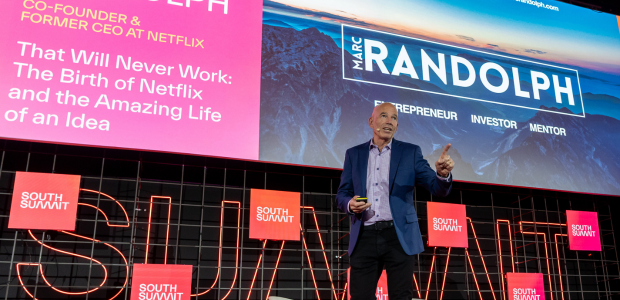
Marc Randolph, co-founder of Netflix, stated at South Summit Madrid that “success doesn’t come from having a good idea, but from having a culture that allows you to fail.”
South Summit Madrid 2025, the leading global event for the innovation and entrepreneurship ecosystem, co-organized with IE University, featured a standout appearance on the afternoon of its second day by Marc Randolph, co-founder of Netflix.
Randolph is one of Silicon Valley’s most experienced and respected executives and entrepreneurs, having co-founded the movie and TV series streaming service Netflix in 1997. For six years, Marc Randolph served as the platform’s CEO, playing a key role in its transformation from a small DVD-by-mail rental company into the world’s leading streaming service, with over 300 million subscribers.
In his talk, he emphasised that “to become an entrepreneur, you don’t need a good idea – you need hundreds of bad ones. Netflix’s greatest achievement was realising that it’s not about having good ideas, but about building a corporate culture that allowed us to try them all – even the bad ones. The more failed experiments you run, the faster and cheaper you innovate.”
In a conversation with Diego del Alcázar, CEO of IE University, Randolph also mentioned that since leaving the company, he has founded seven more businesses, some more successful than others: “If you had asked me on day one which ones would succeed, I wouldn’t have been able to tell you. Nobody knows anything. That’s why the only option is to do something, to try, to build. You learn more in an hour of doing than in six months of planning.”
Cleantech: Investing with impact, scaling with profitability
Another highlight of the afternoon was the session "Cleantech Funding: It's Not Just About Money", where Nicolas Sauvage, President of TDK Ventures, and Irene Gálvez, Head of the Clean Technologies Capital Division at the European Investment Bank (EIB), shared a common perspective: without scalability and financial sustainability, there is no real impact.
Sauvage shared his experience investing in early-stage industrial startups, emphasising that the success of a green project relies on its ability to build solid economic models from the outset. “Without strong business models, there’s no first factory, no second, no growth. It’s not about doing good or making money – it’s about being able to do both,” he stressed.
For her part, Irene Gálvez explained how the EIB seeks precisely to facilitate this path to scale: “As the planet faces more frequent and severe climate crises, investing in cleantech startups has never been more critical. Investment platforms like TechEU being launched by the EIB offers significant opportunities for cleantech startups to grow and scaleup in Europe without the need to go to other capital markets to meet their financial needs. While funding is of the essence, we are also providing startups faster and simpler processes, financing and technical expertise and a one-stop shop to access all opportunities available for innovators at the crossroads of climate and technology”
Smart growth: the key to success in the Latin American ecosystem
The session 'Scaling Smarter: Navigating Growth in Latin America's Startup Ecosystem' brought together Pedro Conrade, founder of the Brazilian unicorn Neon, and Santiago Muguruza, Head of BBVA Spark, on the main stage to talk about the challenge of scaling a startup in Latin America. A market with structural challenges, but also with enormous potential: in 2023 alone, more than 4,500 million dollars were invested in startups in the region.
"If I had known how difficult it was to set up a bank, perhaps I would not have done it," joked Pedro Conrade when recalling how he founded Neon at just 23 years old. The idea was born out of frustration with the traditional financial system: "It was very expensive for the user and poor for companies. That's how the idea of a card connected to an app came about. Today, Neon has more than 15 million customers and a comprehensive financial services offering."
From the other side of the table, Santiago Muguruza said that "banks traditionally look to the past. We looked to the future and saw that innovation was no longer exclusive to Silicon Valley. This is how BBVA Spark was born, to offer financing to startups at different stages, regardless of the market."
South Summit Madrid 2025 will continue tomorrow, Friday the 6th, with the announcement of the global winner of the Startup Competition, one of the most anticipated moments of each edition. María Benjumea, president and founder of South Summit, and Diego del Alcázar, CEO of IE University, will close the meeting with a prominent visit by Enrico Letta, former Prime Minister of Italy.
#SouthSummit25 has the institutional support of the Secretary of State for Digitalisation and Artificial Intelligence, the Community of Madrid and the Madrid City Council, as well as Mutua Madrileña, Google for Startups, BBVA Spark, Wayra – Telefónica Innovation and BStartup of Banco Sabadell.

